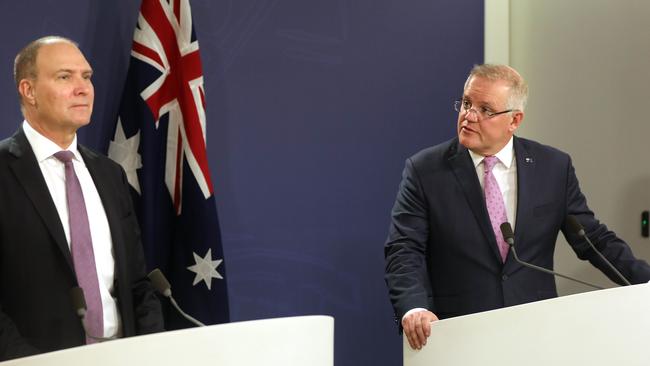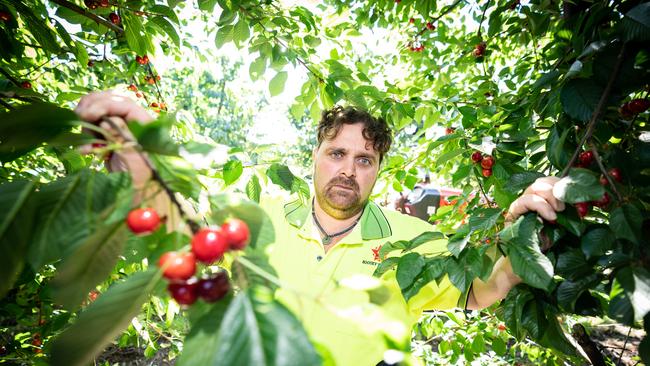JobKeeper ‘distorts the market’, says COVID Commission Nev Power
Extending JobKeeper risks preventing workers joining industries that desperately need them, warns the government’s COVID commissioner.

The continuation of JobKeeper beyond its current end date would risk distorting the job market, discouraging workers meeting increasing job shortages in agriculture, food processing, health care, tourism and hospitality, the chair of the national COVID Commission Nev Power has warned.
“The time has come for JobKeeper to end because of the risk of it distorting the labour market,” he said in an interview with The Australian ahead of a speech to the Australian Institute of Company Directors governance conference on Tuesday.
He said the continuation of JobKeeper, which provides a subsidy for employers of businesses hit by COVID to retain workers, meant that some businesses were still hanging onto workers they would ultimately lay off one the allowance stopped at the end of March.
“Those businesses which may ultimately need to reduce their workforce at still hanging onto them,” he said.
“We need to release those workers to move to other areas where there is demand.”
Aviation and tourism industries are among those most reliant on the scheme with thousands receiving JobKeeper while international borders remained closed through COVID. At the same time the program has come under focus for giving some profitable industries a leg up, but lowering their wages bill.
Mr Power, a Perth businessman who is the former chief executive of Fortescue Metals Group, was appointed to run the COVID Commission, an advisory group of business leaders on tackling COVID related issues, in March last year.
Other members still on the board include Melbourne businessman Paul Little, company director and former secretary of the Federal departments of health and finance, Jane Halton, KPMG national partner, and former union leader Paul Howes and the chief executive, founder of the Roll’d restaurant group Bao Hoang.
Former Telstra chief executive David Thodey stepped down from the commission in December.
Mr Power, who is also chair of Perth Airport, said most people in business were telling him there was now a shortage of labour in many areas.
“They are saying they have jobs and they want to employ people, but because of labour mobility issues and the JobKeeper and JobSeeker supplements, it is delaying the transition of people.”
“Labour demand is relatively high because our economy is performing pretty well and we don’t have the migrant workers, the seasonal workers and the holiday visa workers.”
“There are significant areas such as health care, aged care, tourism, hospitality, agriculture and food processing which are finding it difficult to get labour.”
“Once the JobKeeper and JobSeeker supplements end, it will allow a great mobility of labour to go the areas where it is needed.”
Mr Power said the prospect of closed international borders meant it was time to reassess the need to train workers for jobs which would otherwise have been met by workers from overseas.
“We are seeing a higher level of demand in our health system and in aged care.
“We need to have people retrained and upskilled in those areas.
“International travel and getting in international workers is going to be more difficult for the next couple of years.
“We need to think how we can meet more of our labour demand domestically and get more of our young people into these roles.”
Mr Power urged businesses to be prepared for the end of JobKeeper and to be ready to step up their activity in response to policy changes including the opening up of sectors of the economy rather than being too risk averse and waiting for “certainty.”
“There is a high level of uncertainty so therefore businesses need to be more agile and respond to changing circumstances,” he said.
“We don’t want the risk management committees on boards locking the place down to try and manage risk.
“We want them to be much more responsive.”
“They need to be assessing risk on a much more frequent basis,” he said.
“They need to be tracking what is occurring on a more frequent basis and responding accordingly.”
Mr Power said there was no point in companies calling for a national policy on state border closures given the nature of the federation.

He said companies just needed to get on with responding to changes, including different state governments having different policies, rather than waiting for certainty on government policies in response to COVID.
“Some businesses are continually calling out for a national consistent system for border closures,” he said.
“I don’t see that that is going to happen”.
“We are going to roll out the vaccine between now and November.”
“By the time we have negotiated a national protocol on border closures we will have the vaccine rolled out.”
Meanwhile, Mr Power said businesses should be doing what they could to be encouraging employees and the community to support the vaccine roll out and help to make it as efficient as possible.
“That is the fastest way to getting back to business as usual,” he said.
Mr Power said businesses should not jostle for position to get their staff vaccinated against COVID ahead of other workers or sectors.
The experience in the UK and the US had shown that the more there was a prioritisation of people who should be vaccinated, the slower the process took.
“There will be a vaccine for everyone,” he said.
“The best thing we can do is to roll it out as fast as possible.
“All of Australia benefits by getting the vaccine roll out as quickly as possible. There should be less prioritisation cohorts.
“There is no need for businesses to jostle for position or to try to put up cases for being a priority.”
Mr Power said the role of the COVID Commission had changed from its original work of helping out with the crisis including sourcing personal protection equipment, handling supply chain issues, helping industries develop COVID safe working places and getting food to remote areas of the country.
“Business, community and government have been able to get into more of a rhythm about the management of COVID,” he said.
“We understand it better and we are able to manage it better,” he said.
He said the goal of the Commission now was to try to get the economy re opened and restarted as quickly as possible.
He said while many sectors of the economy were turning around and coping well, the Commission was focusing on areas where there were still problems.
He said the issue of labour mobility and job shortages in different sectors and regions, at a time when there was also youth unemployment, was emerging as one of the key areas which was affecting the economy as a result of COVID.
“As business gets back to more normal, the Commission is about trying to understand where the hot spots are going to be and what is needed to help with them.”




To join the conversation, please log in. Don't have an account? Register
Join the conversation, you are commenting as Logout